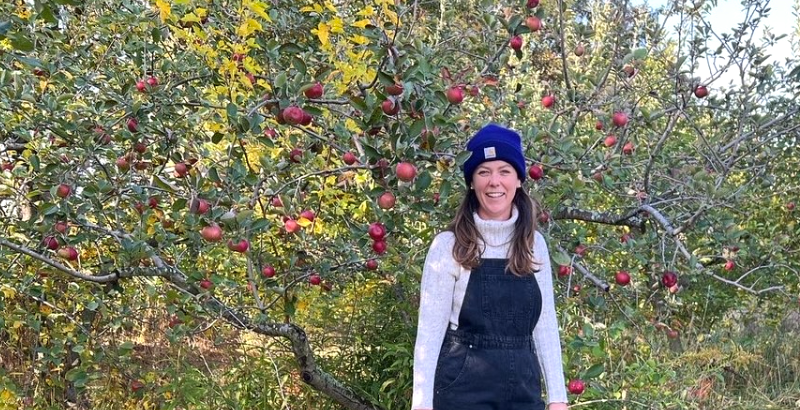On a crisp autumn morning, I drove out to Villa Grove to learn about Meyer Produce’s 25-acre farm. Dressed in overalls and accompanied by her two dogs, farmer Molly Oberg took me on a walk of her farm.
Between laughs and petting her canine assistants Sheba and Violet among the farm’s apple trees, I learned how the co-owner of Meyer Produce became a farmer and what it’s like to work on this farm. She talked about the crops, the land, selling produce at C-U farmers’ markets, and even how her childhood Barbie play influenced her farm business.
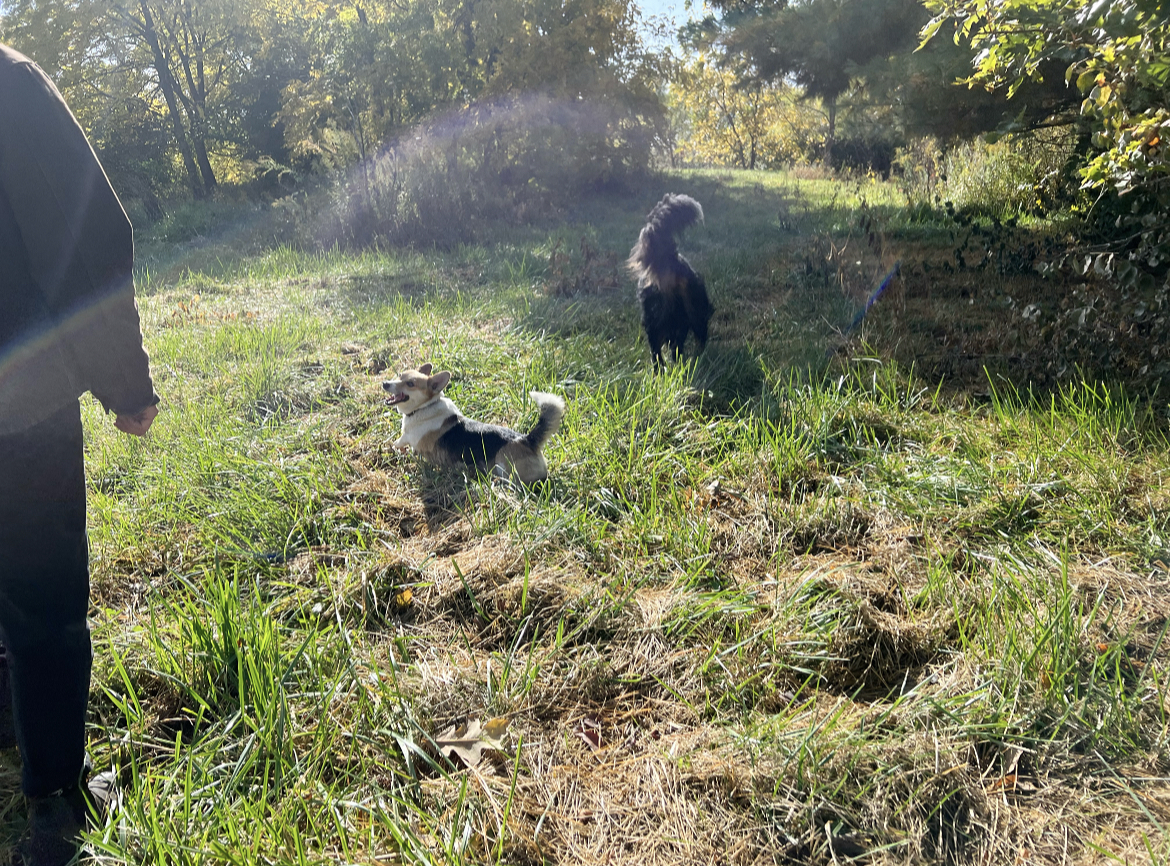
Photo by Alyssa Buckley.
Smile Politely: Molly, let’s start at the beginning. How did you become a farmer?
Oberg: I found myself on a farm when I married someone that wanted to farm. [laughs] Ben always wanted to be a farmer, and when we got married, I did not know what my role was. I thought my role was going to be the stay-at-home mom or the farm wife thing.
I’ll never forget the day when Ben called and asked for my help. I was just hooked. I quickly realized that the farm needed some things that I could do, so I stepped right in. I jumped right in — and the water was really cold!
SP: When did you jump in? The start of a season or later in the harvest?
Oberg: We got married at the end of May, which we both regret because that’s one of the busiest times. When we have our anniversary, we can’t really go anywhere and celebrate it because the farm is busy. May is the beginning.
SP: May is the beginning for the markets, but I bet for the farmer, your beginning is even earlier, yeah?
Oberg: Yeah, we usually start at the beginning of March or end of February depending on the temperatures.
SP: Did Ben already have the farm when you married him?
Oberg: So Ben has worked on this farm since he was 15, off and on. It all goes back to the Urbana farmers’ market. Ben has a sister that raised goats as a teenager, and they were milk goats. She had a lot of extra milk, so she wanted to turn it into a product she could sell. She started making soaps and selling at the Urbana farmers’ market. Ben’s mom would go and help her set up. They actually became friends with Jeff Meyer, and Jeff told Linda (Ben’s mom) that he was looking for someone to help him out at the farm.
Linda was like, “Well, I have a son that will work! He can come work for you.” Then Ben finished high school and went to school to become a diesel mechanic. He did that job for a year, and he didn’t like working in the shop. He picked up working for Jeff Meyer more at the farm, but that’s only seasonal work; it’s just six months out of the year.
SP: How did it happen that you and Ben became the owners of the farm?
Oberg: So Ben and I started dating, and Jeff was getting ready to retire. He offered the farm and the business to us as a package deal — the property, business, land, everything — at a price we couldn’t say no to. We thought we should at least try it. We worked for Jeff as a couple for two years, and when those two years were up, we had to make the decision — which we kind of already knew we wanted to do it, so we went ahead and did it.
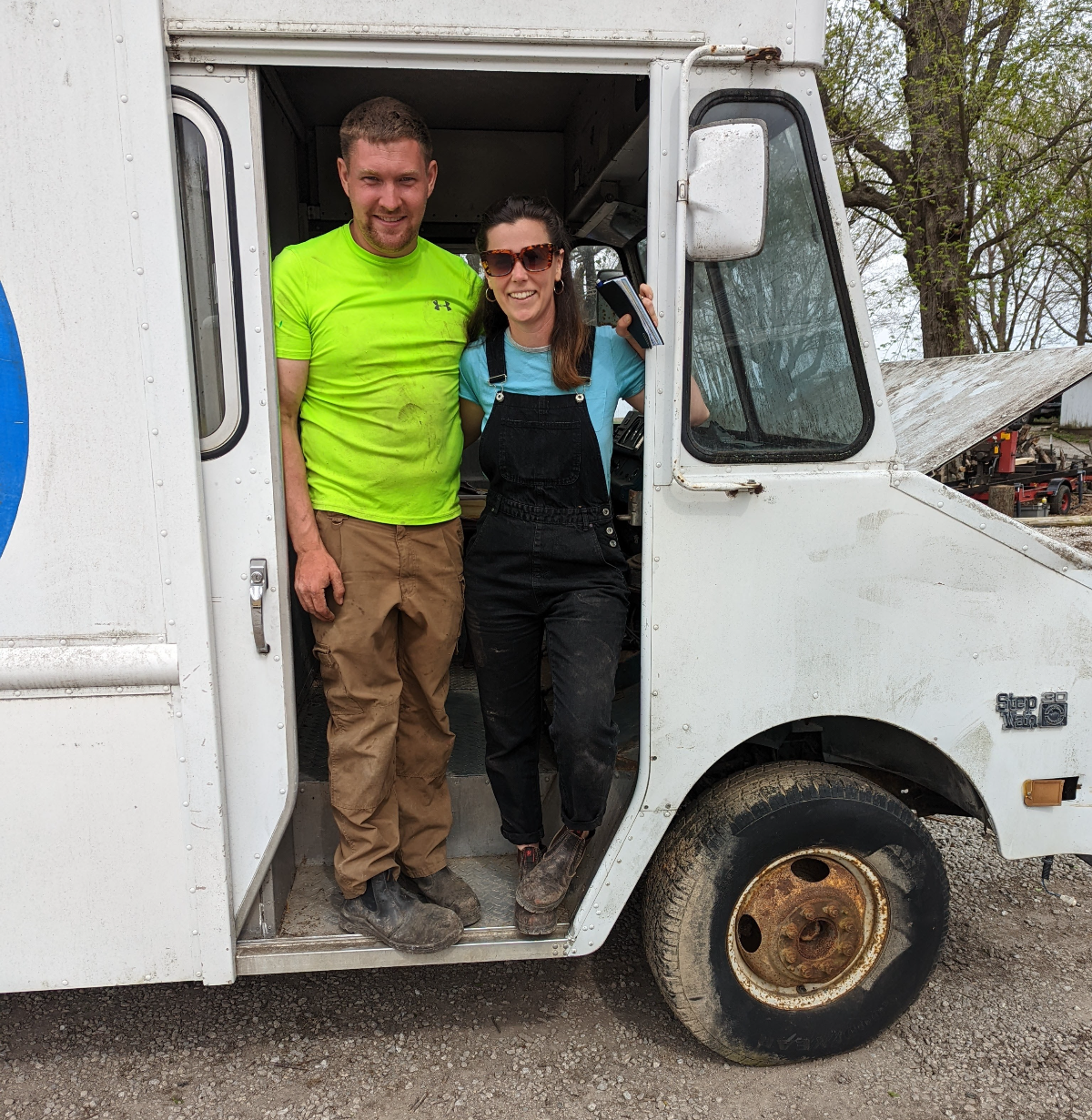
Photo by Meyer Produce.
SP: Okay, this sounds like you were there from the beginning. It was Ben’s dream, but you became an owner with him.
Oberg: Yeah, when we were dating, we had to figure out if we could actually work together as a couple. Not everyone can do that.
SP: Did you think you’d ever be a farmer when you were little? What job did you want to have when you were a little kid?
Oberg: I don’t really know how to answer that. I was brought up to be a sort of mom and a housewife, but looking back in my childhood, I can see how the things that I was interested in have played a big part in what I do today. I was never somebody who was like, “That’s what I want to do!”
I love taking something that’s old and needs fixed and brought up to speed in a practical efficient way. I found that I really like doing that with business, and this business needed a lot of updating and bringing up to speed. It didn’t have a web presence, and nobody really knew much about it.
SP: That’s wild because now the farm has almost daily updates on Instagram. It feels caught up to speed, for sure. Don’t you even use Meyer Produce stickers and branded paper bags at the market?
Oberg: Yes! I love decorating. I have a lot of sisters, and we had a ton of Barbies growing up. My grandma had a big trunk, and it was so much fun to go and find the matching outfits. I don’t remember enjoying the playing; I just remember setting it up and making things efficient and cute. I’d go, “Oh, this is what it looks like. Cool, I’m done now!” [laughs]
SP: Isn’t that like your farm? You plant it, set it up, and then you’re done until it grows?
Oberg: Yeah, totally. Oh, this is the orchard.
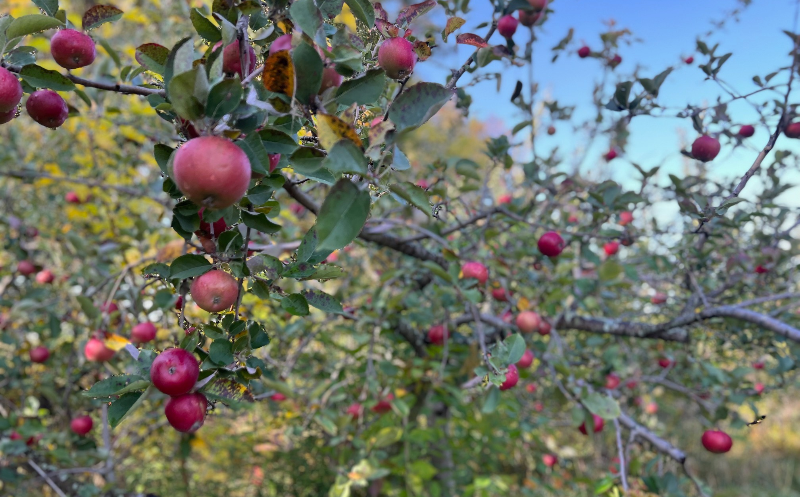
Photo by Alyssa Buckley.
The big fall thing is apples and raspberries. When the weather turns cold, the raspberries taste extra delicious. The flavor is really intense.
SP: What are the first things you plant in a season on your farm?
Oberg: We start with potatoes, then onions and shallots. Those crops did not do well this year. The next thing that we plant are cole crops, all your brassicas: broccoli, cauliflower, cabbage, kohlrabi, that kind of thing.
Here, these are our peach trees. They are four years old. They grow quicker than apples.
Over here, this is our big watermelon patch.
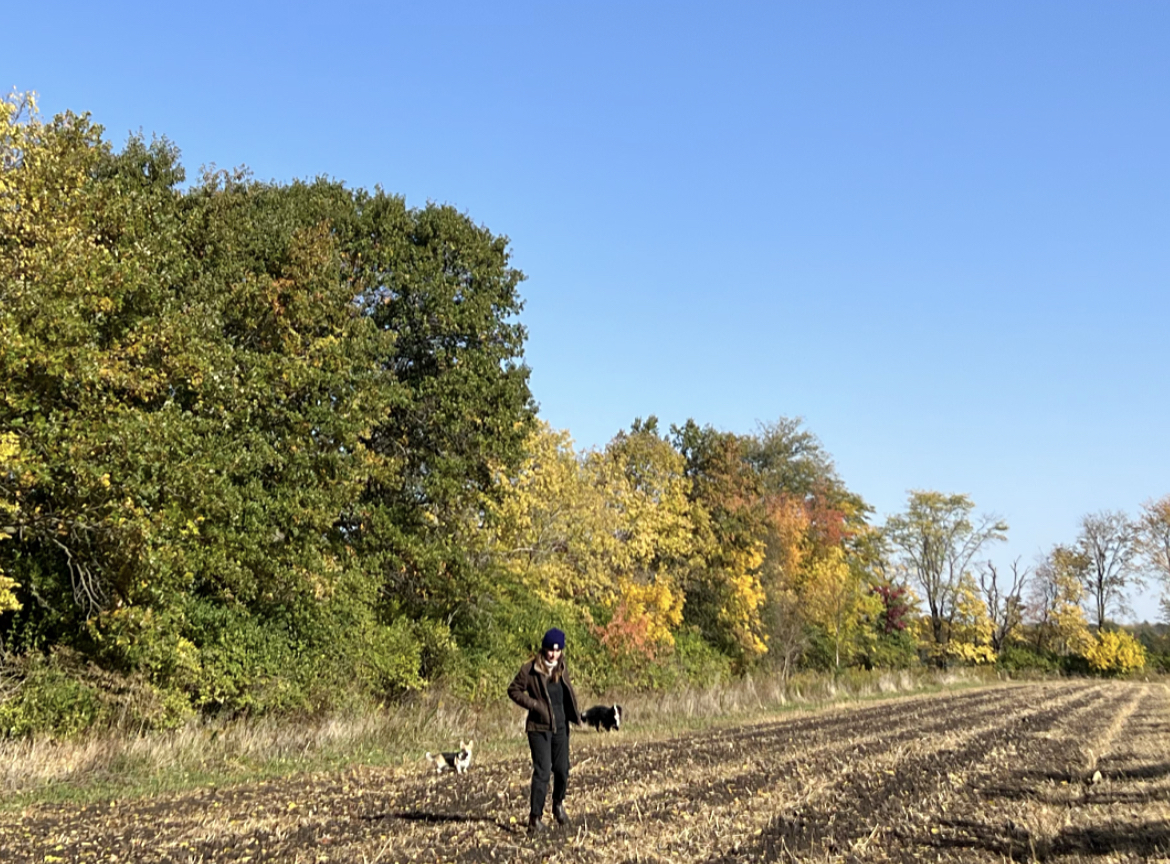
Photo by Alyssa Buckley.
This watermelon patch is the edge of the property.
SP: Talk to me about how your farm gets ready for the market.
Oberg: We can usually harvest the plant for a couple of months, but the plant does not always produce the same amount every week. We get just a few the first couple weeks. Then the plant will be really heavy, and we can harvest a lot. Then it’ll slowly dwindle down, so we do multiple plantings because of that, so we have a good supply of produce.
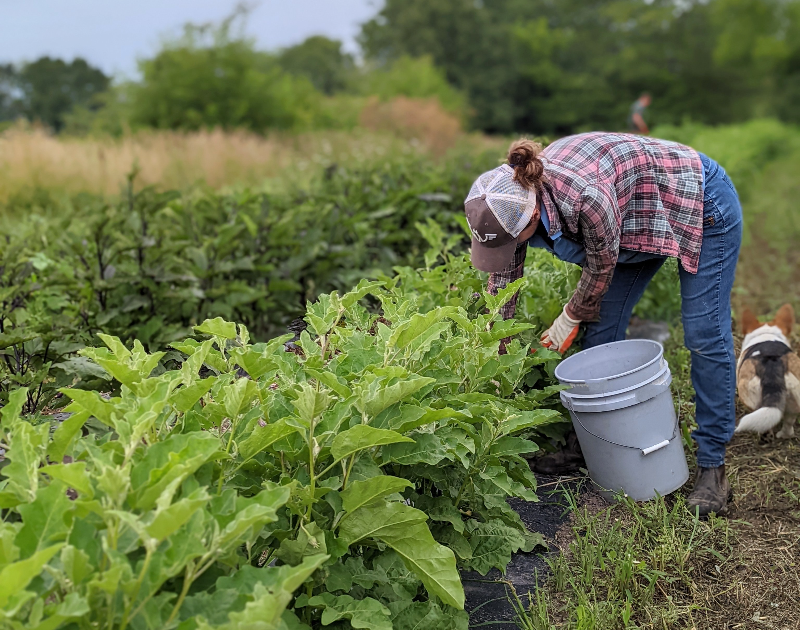
Photo by Meyer Produce.
We have to harvest. Some things are harvested multiple days in a week, and some plants are harvested just one time a week. We’ll harvest, and some things get put in storage in a big walk-in cooler, so they stay fresh. Some things like tomatoes we’ll put in an insulated box, so they don’t get too hot. We’ll harvest and put it into whatever storage it needs to go into. Friday is our really big day, it’s our #FridayHarvestHustle.
SP: Your farm has three trucks now. Do you store harvested food in them?
Oberg: We try and keep things organized in the cooler. Mondays, Wednesdays, and Fridays is always zucchini, cucumbers, berries, and some other things. We label each box and put it in the cooler. On Friday, anything that doesn’t have to go into cold storage, we usually pick on Thursday or Friday, so it can be put just straight onto the truck. The stuff in the cooler we load super early on Saturday mornings before the market.
SP: What time is that?
Oberg: Usually 3:30 a.m. we’re up. We’re at the farm by 4ish, load the trucks, and drive a train of trucks to the market. We have tents, tables, displays, bags, and loads of food. Signs have to go out. Tables have to be stocked throughout the day. Not only do we have people checking out, we have people that are stocking the tables and answering questions.
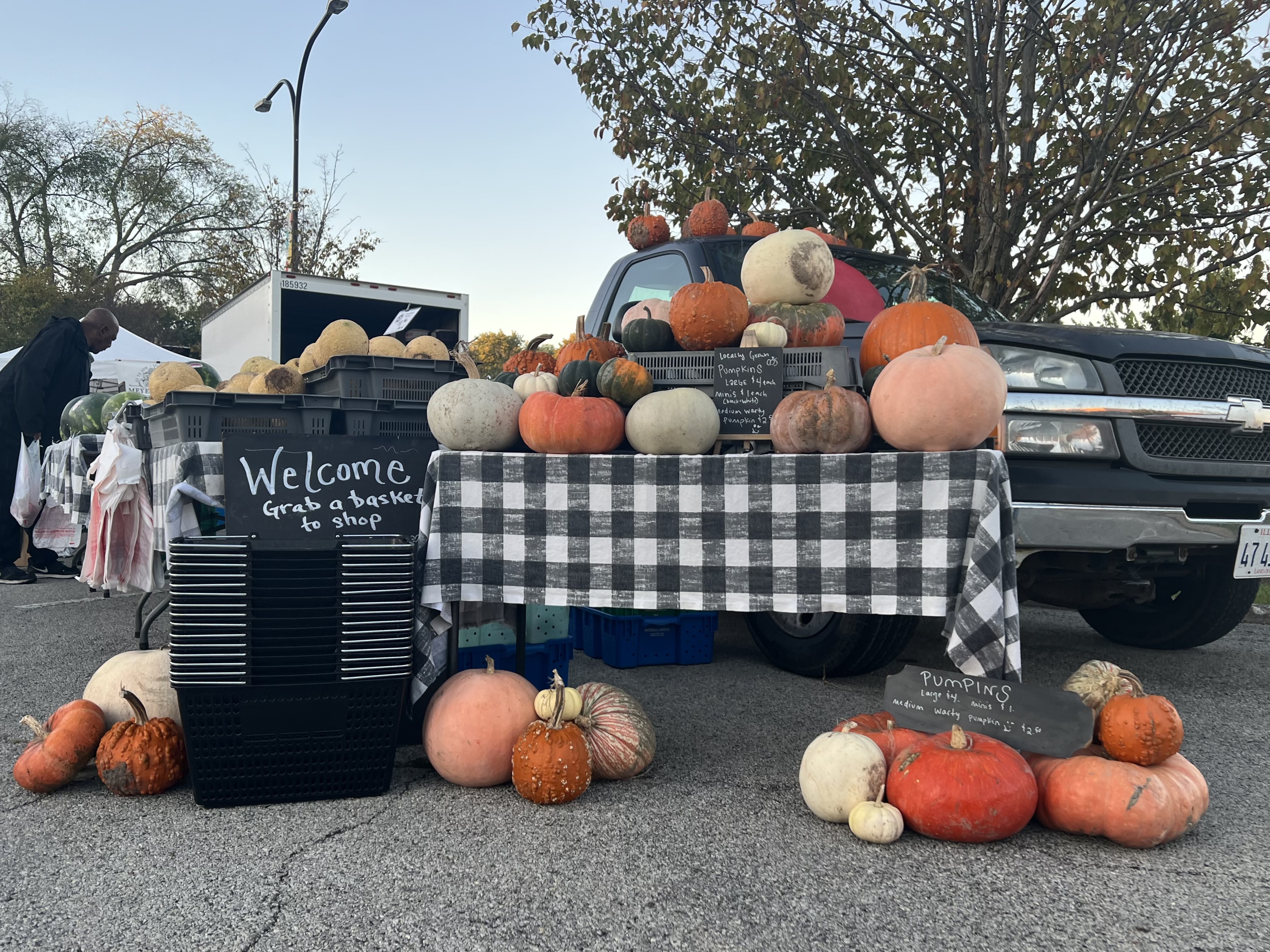
Photo by Alyssa Buckley.
SP: Your Urbana market stand is pretty big this year. Is it bigger than last year?
Oberg: So we grew. Our spaces change throughout the season; we used to do five and then grow to seven spaces. I told Ben I thought we’d have a lot this year, and so we changed our spaces to start with seven and then move up to nine spaces.
SP: With the closure of Blue Moon this year, do you feel like you have more customers this season?
Oberg: It has been so so busy, and it’s been very rewarding because people are so grateful for what we’re doing. That just means so much to us because our work is really really hard and intense for six months out of the year. Just to see people be appreciative means a lot to us.
SP: Tell me about your tractors and cool equipment.
Oberg: We have a lot of specialty equipment which is very different from corn or soybean farms. We have different sizes of tractors that do different things. We have tractors that till the ground or plow the ground. We have smaller tractors that pull different planting implements behind them. We have a bare root planter that helps us plant cole crops and onions in the spring. We have a pocket planter that helps us plant potatoes, and we have a water wheel planter that helps us plant all the seedlings.
SP: Do you get to drive them?
Oberg: I do!
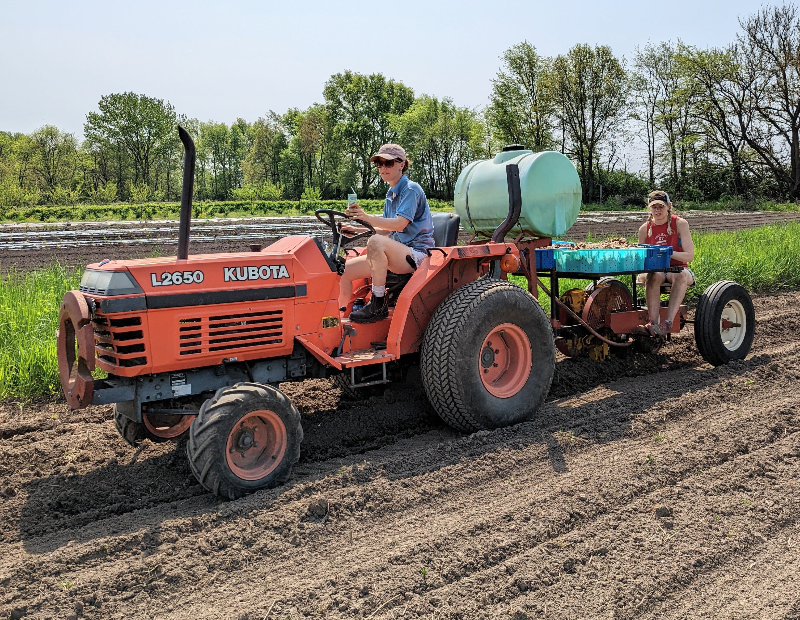
Photo by Meyer Produce.
It depends on how busy we are. This spring, Ben and I did have to take turns, and we had enough help that we could do multiple things at the same time, which was really nice. My sister and I did some onions and potatoes while Ben did something else.
SP: Talk about being a producer for the Artisan Cup & Fork.
Oberg: It’s really fun. We’re assigned a chef; then we send them a list of what produce we think we’ll have, and they pick from it. This year, we were actually able to donate the produce, and because we donated the produce, The Land Connection gave us complimentary tickets. We got to go with family, so it was really fun to be together.
SP: Can you share any little moments that make farming feel special?
Oberg: I love getting to work with my family and being able to provide good, honest work for them. I think that’s something I’ve always wanted to do even as a young girl. I always wanted to lift my family up with me. To be able to do that is a huge honor.
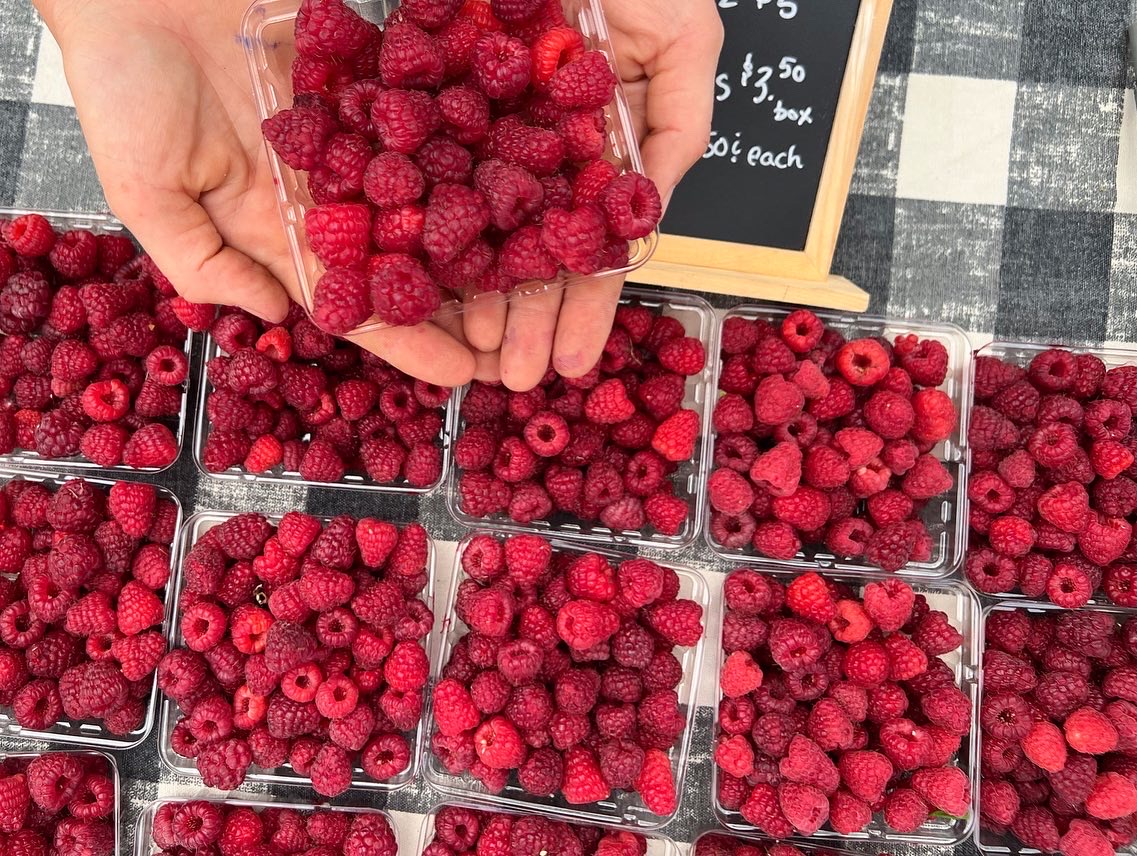
Photo by Alyssa Buckley.
The other thing I really find a lot of joy in is connecting with customers at the market. Like you, Alyssa! Just forming that relationship week by week, and seeing families connect to where their food comes from — and I don’t mean that in a modern, cool “I know where my food comes from” privileged way, but having a relationship with someone that feeds you, it’s a really cool thing. I love that. I love it when people come back and say hello, and we get to know their names.
SP: I always wonder about that. Is it weird to talk to farmers for a bit? Or should I just get my tomatoes and go?
Oberg: No, we love it. Ben is the same way. We have been very busy this year, and we’ve never been this busy. Ben has told me multiple times, “I hope we don’t lose any customers because we can’t visit with them.”
There are some regulars that we do love to visit with and see how their family is doing. In the spring and the fall, it does get slower, and we can catch up then. We love visiting.
SP: What do you do at the end of season?
Oberg: This year has been a turning point for our business. In the past, we’ve just dropped everything because we were so exhausted. This year, we are organized enough to get things wrapped up and in really great shape for next year. That means getting the fields cleaned out, stakes pulled out, plastic out. We’ve been able to till and put cover crop which is good for soil health. We do need to do some ordering. We order our supplies and seeds in the fall because we can get a discount. We do need to plan a little for next season, like what we’re going to grow.
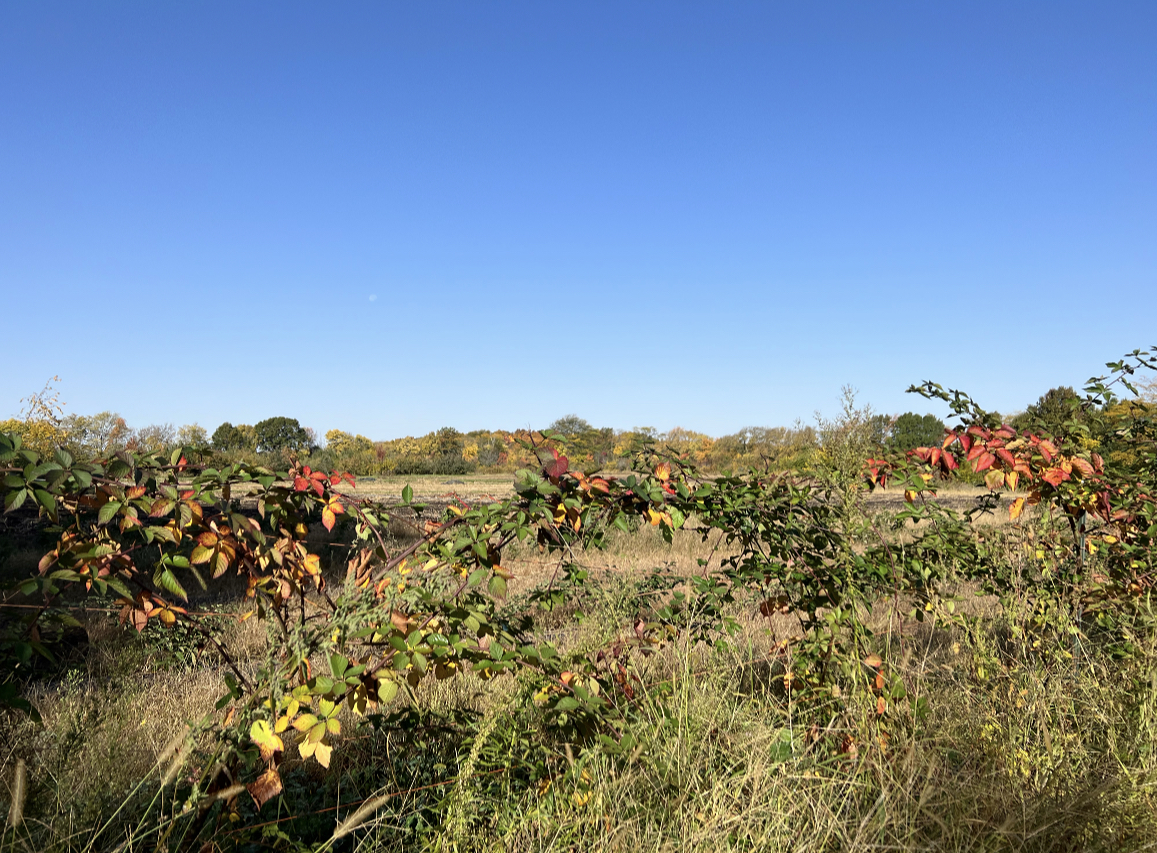
Photo by Alyssa Buckley.
SP: Once you’ve finished all that, what do you do in the off season?
Oberg: Since we’ve been married, we’ve been flipping houses — not to sell but to rent. We’re working on our third house, and we’ve had it for a few years. We’re hoping to get that wrapped up this winter.
SP: Still working with your hands.
Oberg: Oh yeah, still working with our hands. That’s something I really love, going back to the Barbies thing. [laughs] I love doing work on the house, and Ben has the skills to do most everything himself with the houses.
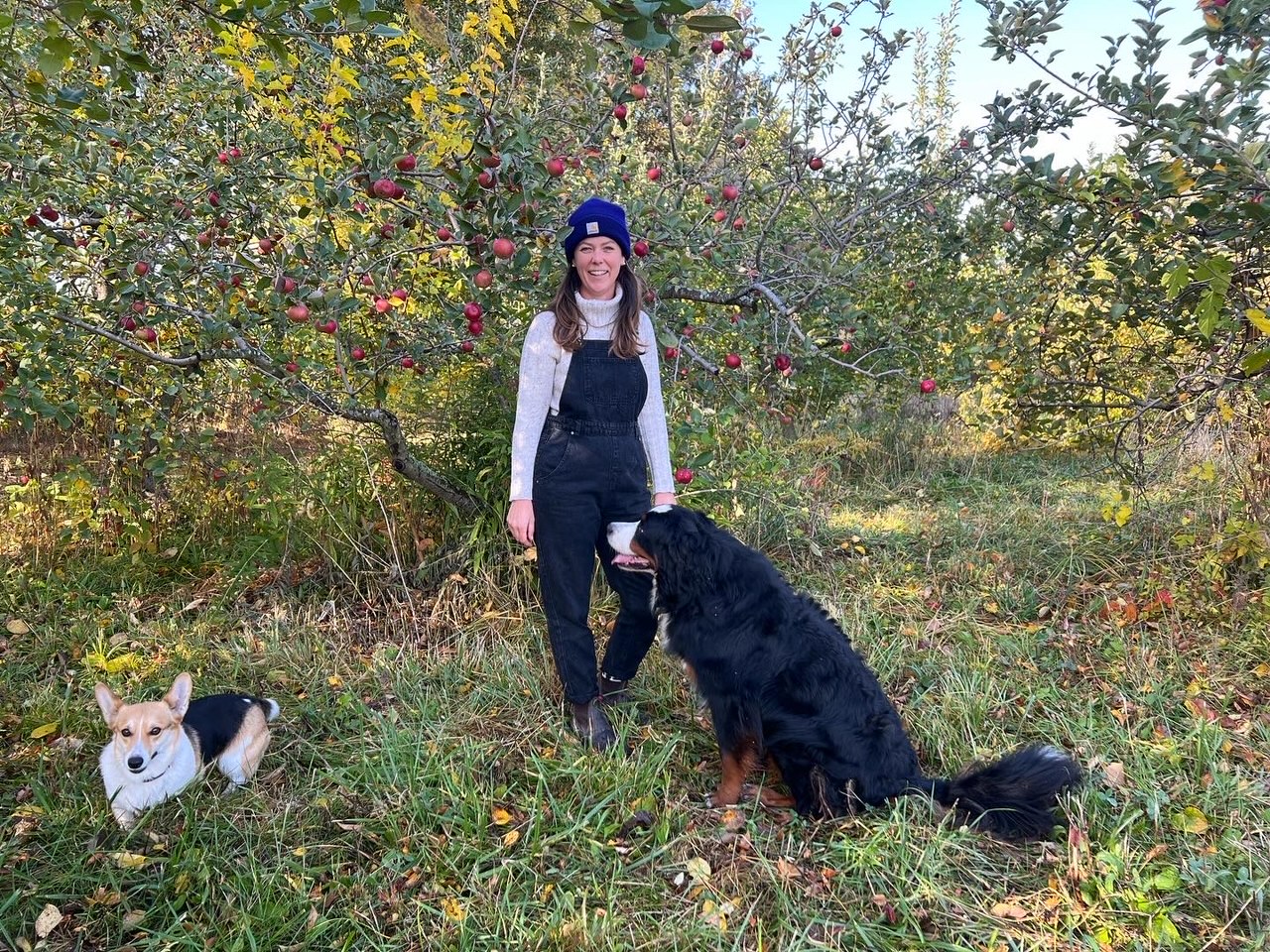
Photo by Alyssa Buckley.
SP: What else should we know about our farmer friend Molly?
Oberg: I don’t really talk about myself very much.
SP: Do you still play Barbies?
Oberg: Girl, with my nieces, you know I do! [laughs] I like to stay really busy. I love thrifting and love to go thrifting with my sister. I love to travel. Ever since we’ve been married, we travel every winter. That’s one perk of our job being on and off for six months at a time. We’ve been to Australia four or five times. Ben has family in England, and I have family in Canada. We do like to travel, and I like to go to new places and see new things.
This year, moving and setting up our house, I’m really looking forward to that. It’s something I’ve been waiting ten years for! We bought a house for us to live in just a mile down the road from the farm. The house was built in 1897, and it has an old barn. I can’t wait to get the barn fixed up, so my horse can come live with us.
SP: Okay, last question: what’s your favorite food or favorite restaurants?
Oberg: We have a favorite place near Mattoon by where we do our grocery run, and it’s called Siam Thai. It is freaking delicious. There’s three little old ladies making everything fresh. Their crab rangoons are homemade. It’s so good you have to go. In Champaign, we like Maize and Black Dog. I love Just BEE Acai, too.
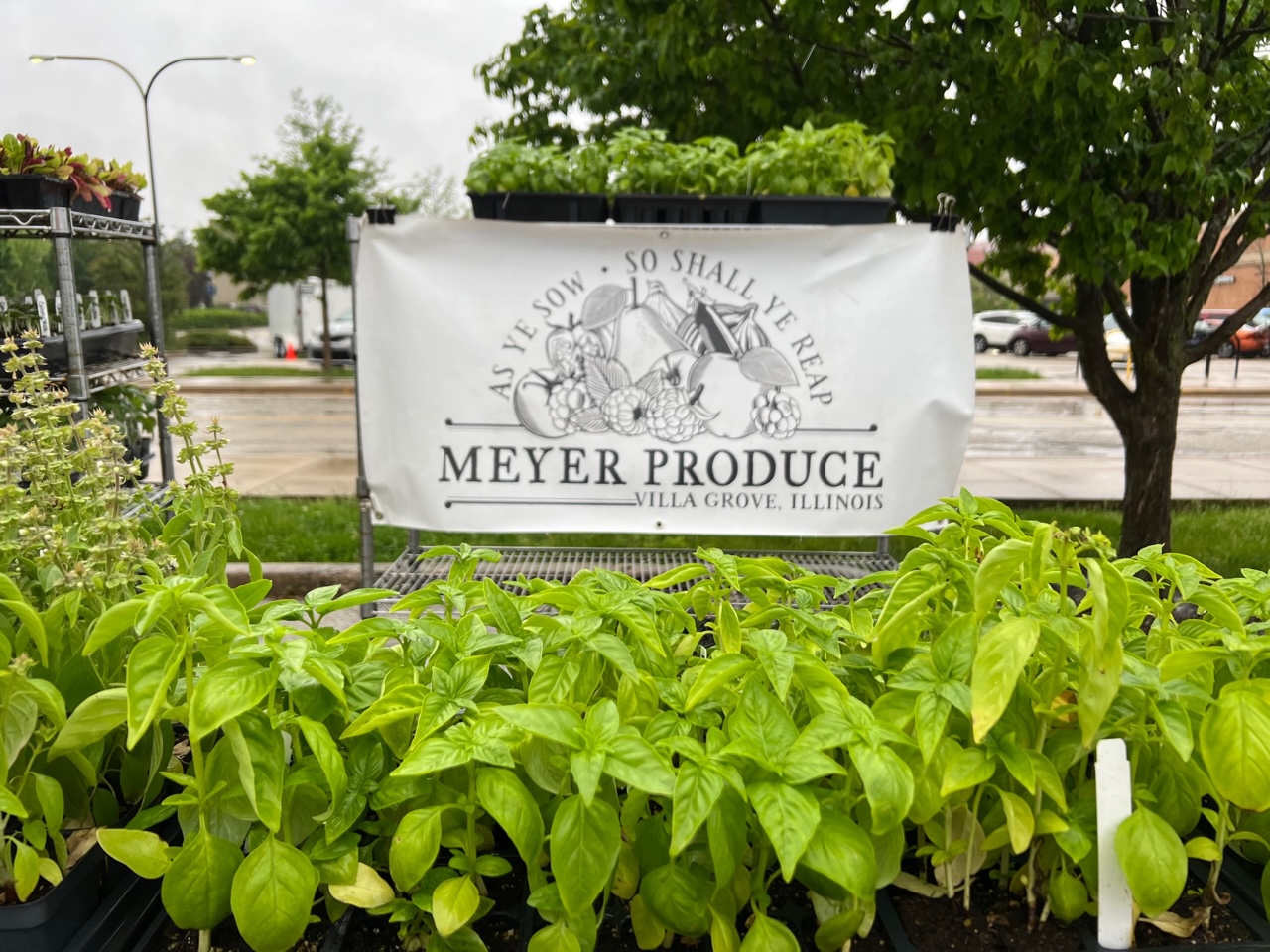
Photo by Alyssa Buckley.
Find Meyer Produce this Saturday, October 29th from 7 a.m. to noon at the final outdoor C-U farmers’ market.








